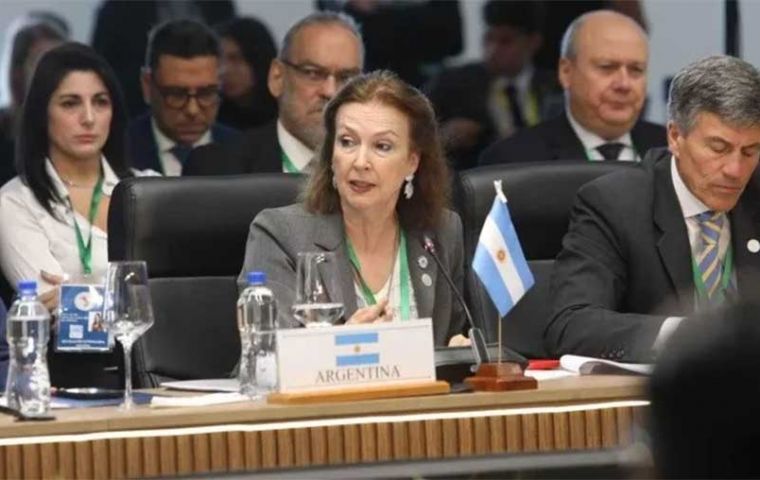MercoPress. South Atlantic News Agency
Argentine FM backs Lacalle's call for a more flexible Mercosur
 Mondino spoke about ceasing to be a small, protected, fearful Mercosur
Mondino spoke about ceasing to be a small, protected, fearful Mercosur In addition to President Javier Milei not attending the 64th Southern Common Market Summit in Asunción, Argentina brought another dissenting note to the regional bloc when Foreign Minister Diana Mondino upheld the idea of brokering unilateral deals with foreign powers or blocs in blunt opposition to Brazilian President Luiz Inácio Lula da Silva's stance on the matter.
Thus, Argentina joined Montevideo's initiative to move forward in negotiations with China, which had already sparked a confrontation between Uruguayan President Luis Lacalle Pou and then-Argentine head of state Alberto Fernández. Under current Mercosur rules, these negotiations are not allowed altogether.
However, Mondino insisted that the bloc should have “flexibility” and accept, depending on the situation, that a country should conclude free trade agreements on its own. “Let's think about the possibility of bilateral agreements. It's very difficult for everyone to agree on every issue. There may be a case where a bilateral trade agreement would be convenient,” argued Mondino in the Paraguayan capital, in line with Uruguay's position.
Although China has been Brazil's main trading partner since 2009, Itamaraty pledged not to negotiate with Beijing solo because it would be contrary to what Mercosur's founding Treaty of Asunción provides for. Brazil's view is backed by that of Paraguay who would never negotiate individually with Beijing given Asunción's closeness to Taipei.
Speaking on behalf of Milei, Mondino also called for “ending tariff barriers” and advocated for an “economic system based on free enterprise.”
“We are in a troubled world. Yet some 300 trade agreements have been reached worldwide. We firmly believe that the best way to face global challenges is to promote the ideas of freedom. For Argentina, ambiguities are over,” Mondino stressed.
“An economic system based on free enterprise is the only tool we have to put an end to hunger, poverty, and malnutrition. This is everyone's goal. We believe that the market is a process of social cooperation, where there are voluntary exchanges,” she also pointed out.
In Mondino's view, Mercosur has an “excess of regulations, that it closed in on itself, and that, with the argument of setting itself up as a 'protective barrier' against imports from third markets, it only limited its own exports, damaging the system of general equilibrium that underlies commercial exchange.”
“We went from 'creating' trade to 'diverting' it. Worse still, our union is a rather imperfect customs union,” she also contended.
“Argentina has initiated a process of state reform. We have reached financial equilibrium and increased aid to the most needy. And we have never disregarded our debts. I share this with you because our goal is to open up to the world and we believe that Mercosur could be the way,” Mondino went on.
“So far Mercosur has not been able to become an instrument of access to large foreign markets. We have not been able, sometimes due to the position of third parties, sometimes due to our own decisions, to reach preferential agreements with countries or blocs that today are part of the most dynamic trade flows at a global level,” Argentina's FM also noted.
”We understand that it is the ideas of freedom that should be our roadmap to stop being a small, protected, fearful Mercosur, a roadmap to achieve, paraphrasing our next President Pro Tempore, my dear (Luis) Lacalle Pou, a more flexible and modern Mercosur,” she concluded as Paraguay handed over the bloc's rotating presidency to Uruguay.




Top Comments
Disclaimer & comment rulesCommenting for this story is now closed.
If you have a Facebook account, become a fan and comment on our Facebook Page!